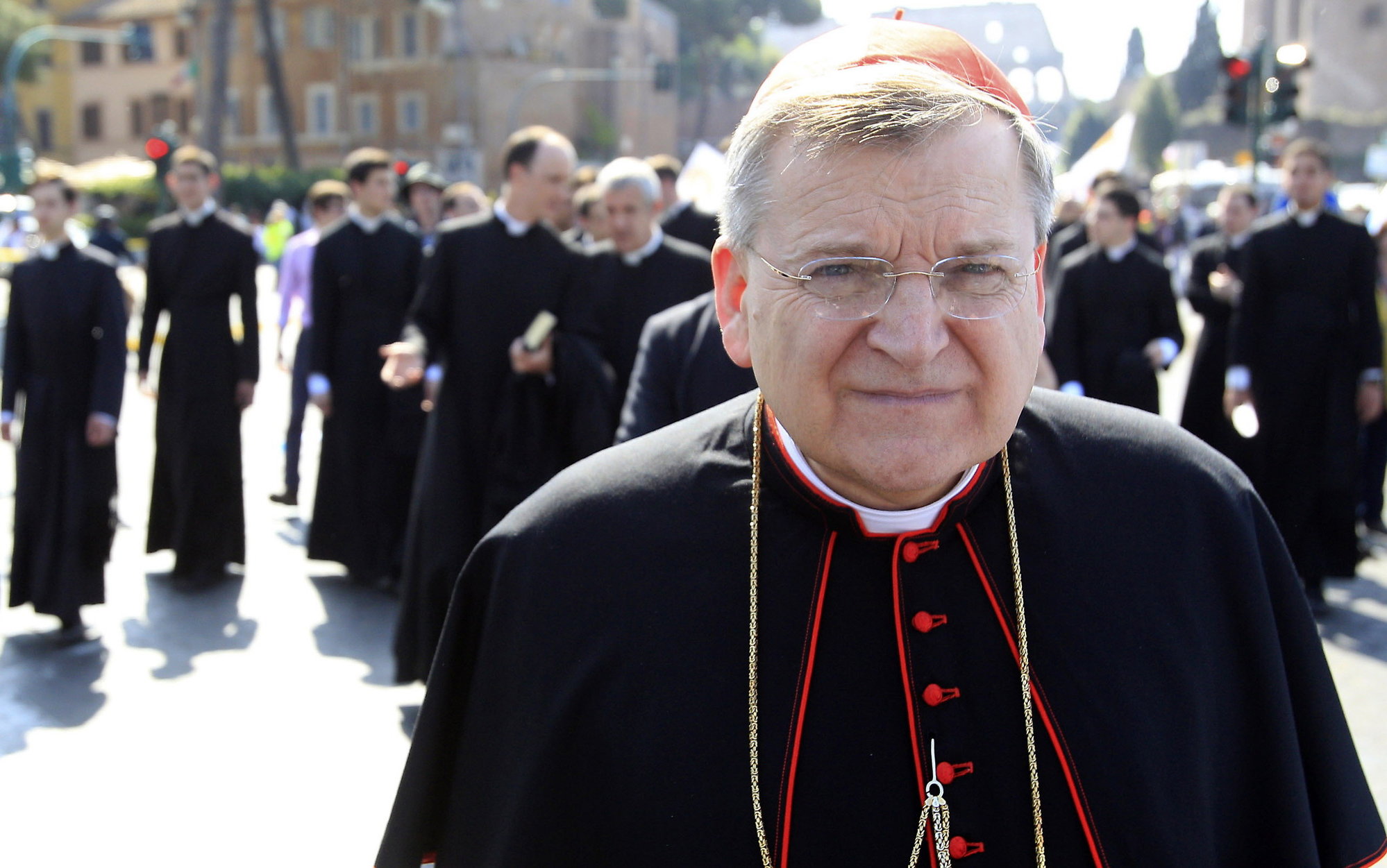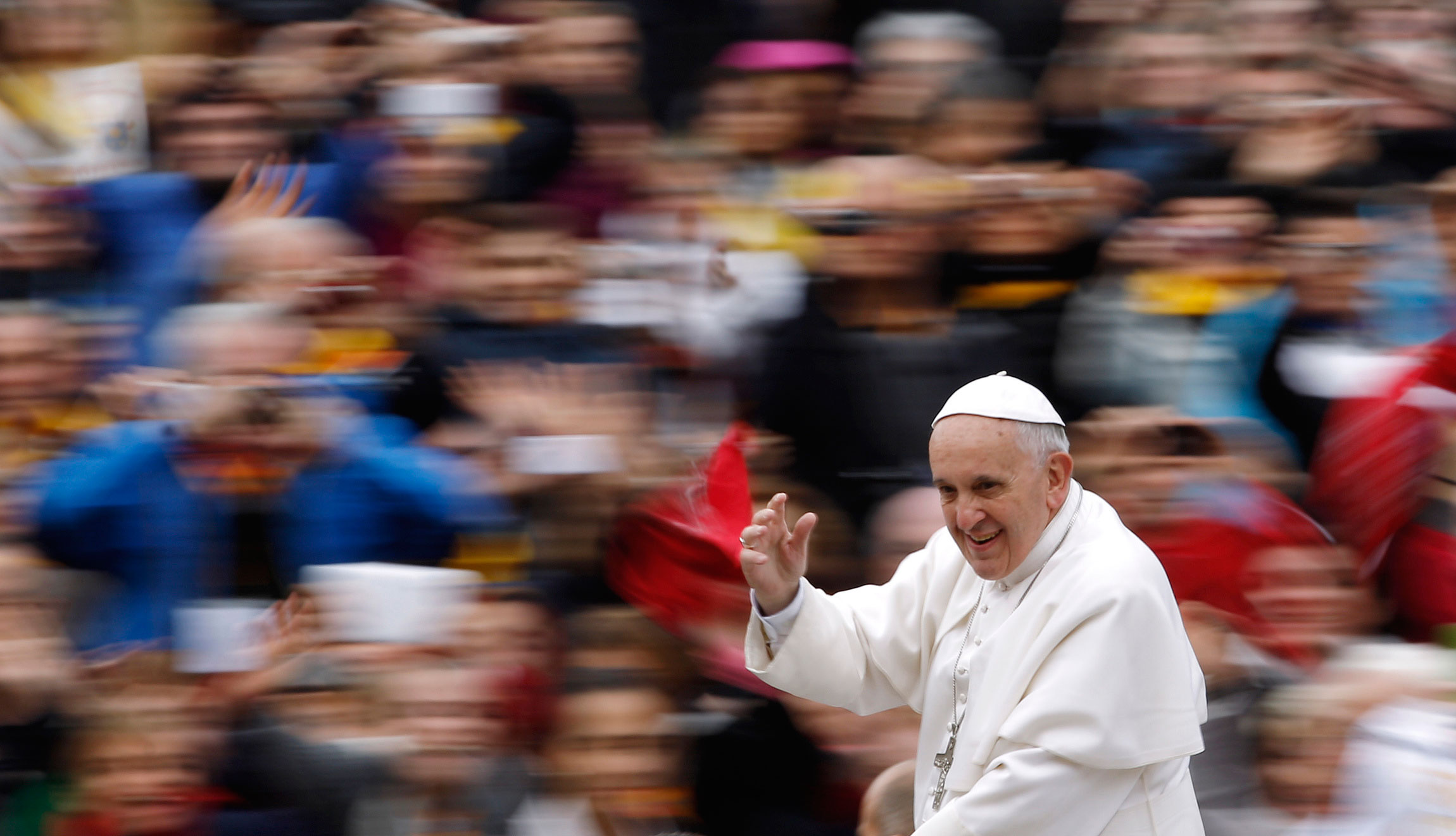
Q. I am very confused about the apostolic exhortation, Amoris Laetitia (“The Joy of Love”) issued by Pope Francis. I’ve been reading a lot of articles online that say that the Pope is changing Church teaching on marriage. Is this true?
A. In a word, no. The Pope did not (and cannot) change Church teaching on faith (what we believe) and morals (how we live). In fact, Pope Francis makes it very clear in Amoris Laetitia (hereafter abbreviated as AL) that he is not speaking infallibly. Nor is the exhortation even to be regarded as an official document of the Magisterium (the teaching office of the Church). He is merely offering his own personal opinion and reflection on the work of the recent Synods of bishops on the family (AL 3).
In fact, AL upholds Church teaching on marriage, and condemns many societal evils, such as abortion, euthanasia, and “gender ideologies” that are cancers in the culture.
Q. Fair enough. But there are some who believe that the document calls for a change – not in the Church’s teaching, but in “pastoral practice” – specifically, that civilly divorced and remarried Catholics ought to be allowed to receive Holy Communion. Cardinal Raymond Burke, who was a participant in the Synods on the family, has written an article in response to this idea. What did he say?
A. The article, which is well worth reading, can be found on the website of the National Catholic Register. Cardinal Burke notes that one can never validly “divorce” Catholic teaching from its application in pastoral practice.
He writes, “I remember the discussion which surrounded the publication of the conversations between Blessed Pope Paul VI and Jean Guitton in 1967. The concern was the danger that the faithful would confuse the Pope’s personal reflections with official Church teaching. While the Roman Pontiff has personal reflections which are interesting and can be inspiring, the Church must be ever attentive to point out that their publication is a personal act and not an exercise of the Papal Magisterium. Otherwise, those who do not understand the distinction, or do not want to understand it, will present such reflections and even anecdotal remarks of the Pope as declarations of a change in the Church’s teaching, to the great confusion of the faithful. Such confusion is harmful to the faithful and weakens the witness of the Church as the Body of Christ in the world.”
Cardinal Burke goes on to say:
“Over more than 40 years of priestly life and ministry, during 21 of which I have served as a bishop, I have known numerous other couples in an irregular union for whom I or my brother priests have had pastoral care. Even though their suffering would be clear to any compassionate soul, I have seen ever more clearly over the years that the first sign of respect and love for them is to speak the truth to them with love. In that way, the Church’s teaching is not something which further wounds them but, in truth, frees them for the love of God and their neighbor.
“It may be helpful to illustrate one example of the need to interpret the text of Amoris Laetitia with the key of the magisterium. There is frequent reference in the document to the ‘ideal’ of marriage. Such a description of marriage can be misleading. It could lead the reader to think of marriage as an eternal idea to which, in the changing historical circumstances, man and woman more or less conform. But Christian marriage is not an idea; it is a sacrament which confers the grace upon a man and woman to live in faithful, permanent and procreative love of each other. Every Christian couple who validly marry receive, from the moment of their consent, the grace to live the love which they pledge to each other.
“Because we all suffer the effects of original sin and because the world in which we live advocates a completely different understanding of marriage, the married suffer temptations to betray the objective reality of their love. But Christ always gives the grace for them to remain faithful to that love until death. The only thing that can limit them in their faithful response is their failure to respond to the grace given them in the sacrament of Holy Matrimony. In other words, their struggle is not with some idea imposed upon them by the Church. Their struggle is with the forces which would lead them to betray the reality of Christ’s life within them.”

Q. This Sunday’s Gospel is taken from John 21. Does this chapter have any implications for the papacy?
A. Other texts, like Matthew 16, are often cited in this regard, but John 21 has one of the strongest proofs for the ongoing role of the office of Peter in the universal Church. Even non-Catholic scholars recognize this.
Q. Does the miraculous catch of fish in this chapter have anything to do with the Petrine office?
A. Fishing, of course, wasn’t just the former trade of the apostles; it represents their evangelistic mission of being “fishers of men”. The unbroken net conveys the unity of the one Catholic (universal) Church. Elsewhere, when Jesus provides a miraculous draught of fish, the nets begin to break from the strain; here, the nets are intact. Peter, dragging the net ashore, evokes his leadership in bringing the Church safely home to Christ, even to the shores of Heaven itself.
Interestingly, although the catch was so big that the disciples struggled to bring the nets aboard, almost sinking their boat, Peter now easily drags the net ashore all by himself. The Greek verb in the original text that is used to describe Peter’s dragging of the net is the same one used by Jesus in John 12:32. This is where Jesus says that, as he is lifted up from the earth, he will draw all people to himself.
Q. Why does the text mention specifically that 153 fish were caught?
A. By far, the most puzzling aspect of the passage is the reference to the 153 fish. First of all, this is an authentic eyewitness detail. On a secondary level, many commentators have proffered various theories to explain what this number might symbolize (John’s Gospel functions on “two levels” – there is often a secondary, “heavenly” meaning to earthly events). Most of these interpretations suggest the idea of the universality or completeness of the catch.
So, to sum up: we have Peter, alone, dragging the unbroken net of a universal catch to the shores of heaven. This is clearly a reference to his position as leader of the Church on earth.
When you add to all of this the threefold charge of Jesus to Peter (“Feed my Sheep”) that immediately follows, the picture is complete. Peter is singularly (in the original Greek text) given this responsibility to shepherd the universal Church. Keep in mind also that this event is recounted in the same Gospel in which Jesus describes himself as the “Good Shepherd” (John 10). Before his Ascension, Jesus here reaffirms Peter’s unique leadership position, passing the earthly reins of the Church to him.

I thought I’d help you celebrate the day when everybody seems to be Irish with a little post about St. Patrick. So, after you’ve enjoyed your green beer, or whatever beverage you may raise in celebration (For me, as a kid, it was always McDonald’s Shamrock Shakes), why not make this prayer of St. Patrick your own?
It’s called St. Patrick’s Breastplate, because of the many times it calls for God’s protection. It’s a classic…enjoy.
I arise today
Through a mighty strength, the invocation of the Trinity,
Through the belief in the threeness,
Through confession of the oneness
Of the Creator of Creation.
I arise today
Through the strength of Christ’s birth with his baptism,
Through the strength of his crucifixion with his burial,
Through the strength of his resurrection with his ascension,
Through the strength of his descent for the judgment of Doom.
I arise today
Through the strength of the love of Cherubim,
In obedience of angels,In the service of archangels,
In hope of resurrection to meet with reward,
In prayers of patriarchs,
In predictions of prophets,I
n preaching of apostles,
In faith of confessors,
In innocence of holy virgins,
In deeds of righteous men.
I arise today
Through the strength of heaven:
Light of sun,
Radiance of moon,
Splendor of fire,
Speed of lightning,
Swiftness of wind,
Depth of sea,
Stability of earth,
Firmness of rock.
I arise today
Through God’s strength to pilot me:
God’s might to uphold me,
God’s wisdom to guide me,
God’s eye to look before me,
God’s ear to hear me,
God’s word to speak for me,
God’s hand to guard me,
God’s way to lie before me,
God’s shield to protect me,
God’s host to save me
From snares of devils,
From temptations of vices,
From everyone who shall wish me ill,
Afar and anear,
Alone and in multitude.
I summon today all these powers between me and those evils,
Against every cruel merciless power that may oppose my body and soul,
Against incantations of false prophets,
Against black laws of pagandom
Against false laws of heretics,
Against craft of idolatry,
Against spells of witches and smiths and wizards,
Against every knowledge that corrupts man’s body and soul.
Christ to shield me today
Against poison, against burning,
Against drowning, against wounding,
So that there may come to me abundance of reward.
Christ with me,
Christ before me,
Christ behind me,
Christ in me,
Christ beneath me,
Christ above me,
Christ on my right,
Christ on my left,
Christ when I lie down,
Christ when I sit down,
Christ when I arise,
Christ in the heart of every man who thinks of me,
Christ in the mouth of everyone who speaks of me,
Christ in every eye that sees me,
Christ in every ear that hears me.
I arise today
Through a mighty strength, the invocation of the Trinity,
Through belief in the threeness,
Through confession of the oneness,
Of the Creator of Creation.

Q. Today’s readings have a common theme: the absolute need to repent of sin, but also God’s abundant mercy for those who do. Would you agree?
A. That’s true. Psalm 103, the Responsorial Psalm from today’s readings, reminds us that “The Lord is kind and merciful”. One of the greatest mercies God provides for us is to “tell it like it is” – to explain reality to us, and warn us of the consequences of not repenting.
This is why St. Paul, in the second reading from 1 Corinthians 10, speaks about members of the Old Testament people of God who did not make it from Egypt to the promised land of Israel. Tragically, these people were “struck down” in the desert because they were not pleasing to the Lord. This was despite the fact that “all of them were baptized into Moses in the cloud and in the sea. All ate the same spiritual food, and all drank the same spiritual drink, for they drank from a spiritual rock that followed them, and the rock was the Christ.”
Q. How does this apply to Catholics today?
A. The same dangers and consequences of unrepentance face the modern-day people of God. Like the Israelites of the Exodus generation, Catholics can sometimes view their baptism as a sort of “lifetime membership card” for Heaven. They frequent the communion lines, but not the queue for the confessional. They “all eat the same spiritual food, and all drink the same spiritual drink – the Christ” in the Eucharist. But they run the same risk that the Israelites did – of being “struck down” in the journey through the wilderness of this life, and not making it to the true promised land of Heaven. The reason is that they feel no need to repent of their sin. Just being “Catholic in name only”, they feel, will be enough to get them “in”. But God is not mocked.
Q. How can we avoid this trap?
A. By sincere repentance, and producing the fruit of the Kingdom in their lives. God will always forgive the one who truly is sorry for their sin, and who desires to change. This is why Jesus reminds us that “God is no respecter of persons”. This means that he judges everyone by the same, objective standard. As Jesus said in today’s Gospel, speaking of people who had died tragically in his time, “unless you repent, you will all perish as they did”.
Jesus then tells a parable about a fruitless fig tree. The owner wants to cut it down, but the “gardener”, who represents Christ, pleads with him to give him more time to “fertilize” it. After one more year, if the tree is still fruitless, the owner can cut it down.
We are like those trees. Christ has given us all the “fertilizer” we need to grow and bear fruit that will last. The scriptures, the sacraments, the teaching of the Church, the community of faith – all the conditions necessary for growth. We never know how much time we have left before we face eternity. Let us not waste this Lent. Who knows? It may be the last one we ever have. Let us truly repent and produce the fruit of the Kingdom in our lives, that we may share in the joy of the resurrection harvest.
 Today’s readings feature God’s admonition to the “reluctant prophet”, Jeremiah:
Today’s readings feature God’s admonition to the “reluctant prophet”, Jeremiah:
The word of the LORD came to me, saying:
Before I formed you in the womb I knew you,
before you were born I dedicated you,
a prophet to the nations I appointed you.
But do you gird your loins;
stand up and tell them
all that I command you.
Be not crushed on their account,
as though I would leave you crushed before them;
for it is I this day
who have made you a fortified city,
a pillar of iron, a wall of brass,
against the whole land:
against Judah’s kings and princes,
against its priests and people.
They will fight against you but not prevail over you,
for I am with you to deliver you, says the LORD.
– Jeremiah 1:4-5, 17-19 (NAB)
The New American Bible translates this passage somewhat differently than many other versions. Most have God saying something like this to Jeremiah: “Don’t break down before them, or I will break you down before them “. The NAB rendering comes out much more reassuringly: “Be not crushed on their account, as though I would leave you crushed before them” (Jer 1:17).
Jeremiah is not on his own. It is God himself who will “fortify” him as “a pillar of iron, a wall of brass”, in order to speak God’s truth to whoever Jeremiah is sent to, without “human respect” – the fear of “what they will say, what they will do”.
We need this courage from God too, in order to boldly hold and profess our Catholic faith in the midst of an often Godless world. But we must live and proclaim it, as Paul admonished Timothy, “in season and out of season” (2 Tim 4:2), when people want to hear the message, and when they don’t.
Today’s Gospel gives us our ultimate example of fortitude in Jesus himself, who didn’t shrink from telling God’s truth to his own townspeople in Nazareth, even though he knew he would alienate many old friends, who were now “filled with fury” (Lk 4:28), attempting to destroy him.
May we, too, never be ashamed of the words of the Son of Man.

“Faith is not only knowledge committed to memory, but truth lived in love” – Pope Francis
The saints are all total Christians. That is, they practice both the corporal and spiritual works of mercy. This is what all Christians are called to do, as we strive to live up to our baptismal call to be saints. And this is a theme that Pope Francis has been hammering away at during this Jubilee Year of Mercy.
It was no different today, as he spoke to the Congregation for the Doctrine of the Faith (or CDF). This is, of course, the office in the Vatican that’s responsible for maintaining doctrinal integrity within the Church. The great Cardinal Joseph Ratzinger was for many years the head of the CDF before his election as Pope Benedict XVI.
Many Christians tend to emphasize either the corporal (looking after people’s bodily needs, such as feeding the hungry, etc.) or spiritual (instructing the ignorant about the Faith, etc.) works of mercy, while often utterly neglecting the other group of works. But the truth is, we can’t neglect either set. Just as the human person was created as a body-soul unity, we must look after people’s bodies and souls. We must be willing to feed people physical and spiritual food (in the Eucharist, we have both). We must have, as Peter Kreeft says, “liberal hearts and conservative heads”. We must hurt for the physically suffering, and also for those who are thirsty for the Truth.
The Pope knows this – hence, his speech today. Here are some of the most relevant snippets below (I’ve highlighted some of what I feel are the most important aspects in bold):
Vatican City, 29 January 2016 (VIS) – “Mercy is the foundation of the life of the Church: the first truth of the Church, indeed, is Christ’s love”, were the opening words of the Holy Father’s discourse to the participants in the plenary assembly of the Congregation for the Doctrine of the Faith, whom he received in audience this morning in the Clementine Hall. The Pope went on to urge all the Christian people, both pastors and the faithful, to rediscover during this Jubilee the corporal and spiritual works of mercy as when, in the twilight of life, we are asked if we have given food to the hungry and given the thirsty water to drink, we will also be asked “if we have helped people to set their doubts aside, if we have committed ourselves to welcoming sinners, admonishing them and correcting them, if we have been able to combat ignorance, especially in relation to the Christian faith and the righteous life”.
“In faith and in charity a cognitive and unifying relationship is established with the mystery of Love, which is God Himself. The effective mercy of God became, in Jesus, affective mercy, as He made Himself man for the salvation of mankind. The task entrusted to your Dicastery here finds its ultimate foundation and and adequate justification. Christian faith, indeed, is not only knowledge to be committed to memory, but also truth to live in love. Therefore, along with the doctrine of the faith, it is also necessary to safeguard the integrity of customs, particularly in the most delicate areas of life. Adhering to faith in the person of Christ implies both an act of reason and a moral response to His gift.”
Do you agree with Pope Francis’ statements here? Share this post and your answers on Facebook, Twitter, or LinkedIn!

Q. Today, Pope Francis released his message for Lent for 2016. It seems hard to believe, but Lent is just around the corner! Ash Wednesday is February 10, and Easter Sunday is on March 27.
A. Yes, this year, Lent is relatively early. It feels as if we’ve just caught our breath after celebrating Christmas, but here we go again! It’s important for us to start thinking about how we can get the most out of Lent, making it a spiritually fruitful time. And Pope Francis is eager to help us do that – hence, his letter.
Q. What are some of the highlights? Is there anything in particular that jumped out at you?
A. As with all of Pope Francis’ writing, there is a lot of spiritual food for thought, served up with many arresting images and scriptural references. I really encourage everyone to read it for themselves. What really grabbed me upon first reading it was the quote from the Gospel of Matthew that prefaces the letter: “I desire mercy, and not sacrifice” (Mt 9:13). In Lent, we traditionally think of making sacrifices – for example, fasting and abstaining from meat on Ash Wednesday and Good Friday. We also think of good things that we “give up” for Lent for a greater, spiritual purpose, like chocolate or dessert.
But Pope Francis, in this jubilee Year of Mercy, wants us to focus not simply on what we give up, but what we can do this Lent – we can practice the works of mercy, helping others experience the love and forgiveness of God.
Q. How does Pope Francis suggest we go about this?
A. The Holy Father calls us to rediscover what the Church has traditionally called “the corporal and spiritual works of mercy”. Here’s how he puts it in the letter: “These works remind us that faith finds expression in concrete everyday actions meant to help our neighbours in body and spirit: by feeding, visiting, comforting and instructing them. On such things will we be judged.”
Pope Francis also reminds us that these “corporal and spiritual works of mercy can never be separated”, and we must practice both if we are to avoid Hell and attain Heaven, which is God’s desire for us:
“In the corporal works of mercy we touch the flesh of Christ in our brothers and sisters who need to be fed, clothed, sheltered, visited; in the spiritual works of mercy – counsel, instruction, forgiveness, admonishment and prayer – we touch more directly our own sinfulness. The corporal and spiritual works of mercy must never be separated. By touching the flesh of the crucified Jesus in the suffering, sinners can receive the gift of realizing that they too are poor and in need. By taking this path, the “proud”, the “powerful” and the “wealthy” spoken of in the Magnificat can also be embraced and undeservedly loved by the crucified Lord who died and rose for them. This love alone is the answer to that yearning for infinite happiness and love that we think we can satisfy with the idols of knowledge, power and riches. Yet the danger always remains that by a constant refusal to open the doors of their hearts to Christ who knocks on them in the poor, the proud, rich and powerful will end up condemning themselves and plunging into the eternal abyss of solitude which is Hell. The pointed words of Abraham apply to them and to all of us: “They have Moses and the prophets; let them hear them” (Lk 16:29). Such attentive listening will best prepare us to celebrate the final victory over sin and death of the Bridegroom, now risen, who desires to purify his Betrothed in expectation of his coming.
Let us not waste this season of Lent, so favourable a time for conversion!”
What do you think? Share your answer in the comments below or on Facebook, Twitter, or LinkedIn.
The official English translation of the entire letter is below:
MESSAGE OF POPE FRANCIS
LENT 2016
“I desire mercy, and not sacrifice” (Mt 9:13).
The works of mercy on the road of the Jubilee
1. Mary, the image of a Church which evangelizes because she is evangelized
In the Bull of Indiction of the Extraordinary Jubilee of Mercy, I asked that “the season of Lent in this Jubilee Year be lived more intensely as a privileged moment to celebrate and experience God’s mercy” (Misericordiae Vultus, 17). By calling for an attentive listening to the word of God and encouraging the initiative “24 Hours for the Lord”, I sought to stress the primacy of prayerful listening to God’s word, especially his prophetic word. The mercy of God is a proclamation made to the world, a proclamation which each Christian is called to experience at first hand. For this reason, during the season of Lent I will send out Missionaries of Mercy as a concrete sign to everyone of God’s closeness and forgiveness.
After receiving the Good News told to her by the Archangel Gabriel, Mary, in her Magnificat, prophetically sings of the mercy whereby God chose her. The Virgin of Nazareth, betrothed to Joseph, thus becomes the perfect icon of the Church which evangelizes, for she was, and continues to be, evangelized by the Holy Spirit, who made her virginal womb fruitful. In the prophetic tradition, mercy is strictly related – even on the etymological level – to the maternal womb (rahamim) and to a generous, faithful and compassionate goodness (hesed) shown within marriage and family relationships.
2. God’s covenant with humanity: a history of mercy
The mystery of divine mercy is revealed in the history of the covenant between God and his people Israel. God shows himself ever rich in mercy, ever ready to treat his people with deep tenderness and compassion, especially at those tragic moments when infidelity ruptures the bond of the covenant, which then needs to be ratified more firmly in justice and truth. Here is a true love story, in which God plays the role of the betrayed father and husband, while Israel plays the unfaithful child and bride. These domestic images – as in the case of Hosea (cf. Hos 1-2) – show to what extent God wishes to bind himself to his people.
This love story culminates in the incarnation of God’s Son. In Christ, the Father pours forth his boundless mercy even to making him “mercy incarnate” (Misericordiae Vultus, 8). As a man, Jesus of Nazareth is a true son of Israel; he embodies that perfect hearing required of every Jew by the Shema, which today too is the heart of God’s covenant with Israel: “Hear, O Israel: The Lord our God is one Lord; and you shall love the Lord your God with all your heart, and with all your soul, and with all your might” (Dt 6:4-5). As the Son of God, he is the Bridegroom who does everything to win over the love of his bride, to whom he is bound by an unconditional love which becomes visible in the eternal wedding feast.
This is the very heart of the apostolic kerygma, in which divine mercy holds a central and fundamental place. It is “the beauty of the saving love of God made manifest in Jesus Christ who died and rose from the dead” (Evangelii Gaudium, 36), that first proclamation which “we must hear again and again in different ways, the one which we must announce one way or another throughout the process of catechesis, at every level and moment” (ibid., 164). Mercy “expresses God’s way of reaching out to the sinner, offering him a new chance to look at himself, convert, and believe” (Misericordiae Vultus, 21), thus restoring his relationship with him. In Jesus crucified, God shows his desire to draw near to sinners, however far they may have strayed from him. In this way he hopes to soften the hardened heart of his Bride.
3. The works of mercy
God’s mercy transforms human hearts; it enables us, through the experience of a faithful love, to become merciful in turn. In an ever new miracle, divine mercy shines forth in our lives, inspiring each of us to love our neighbour and to devote ourselves to what the Church’s tradition calls the spiritual and corporal works of mercy. These works remind us that faith finds expression in concrete everyday actions meant to help our neighbours in body and spirit: by feeding, visiting, comforting and instructing them. On such things will we be judged. For this reason, I expressed my hope that “the Christian people may reflect on the corporal and spiritual works of mercy; this will be a way to reawaken our conscience, too often grown dull in the face of poverty, and to enter more deeply into the heart of the Gospel where the poor have a special experience of God’s mercy” (ibid., 15). For in the poor, the flesh of Christ “becomes visible in the flesh of the tortured, the crushed, the scourged, the malnourished, and the exiled… to be acknowledged, touched, and cared for by us” (ibid.). It is the unprecedented and scandalous mystery of the extension in time of the suffering of the Innocent Lamb, the burning bush of gratuitous love. Before this love, we can, like Moses, take off our sandals (cf. Ex 3:5), especially when the poor are our brothers or sisters in Christ who are suffering for their faith.
In the light of this love, which is strong as death (cf. Song 8:6), the real poor are revealed as those who refuse to see themselves as such. They consider themselves rich, but they are actually the poorest of the poor. This is because they are slaves to sin, which leads them to use wealth and power not for the service of God and others, but to stifle within their hearts the profound sense that they too are only poor beggars. The greater their power and wealth, the more this blindness and deception can grow. It can even reach the point of being blind to Lazarus begging at their doorstep (cf. Lk 16:20-21). Lazarus, the poor man, is a figure of Christ, who through the poor pleads for our conversion. As such, he represents the possibility of conversion which God offers us and which we may well fail to see. Such blindness is often accompanied by the proud illusion of our own omnipotence, which reflects in a sinister way the diabolical “you will be like God” (Gen 3:5) which is the root of all sin. This illusion can likewise take social and political forms, as shown by the totalitarian systems of the twentieth century, and, in our own day, by the ideologies of monopolizing thought and technoscience, which would make God irrelevant and reduce man to raw material to be exploited. This illusion can also be seen in the sinful structures linked to a model of false development based on the idolatry of money, which leads to lack of concern for the fate of the poor on the part of wealthier individuals and societies; they close their doors, refusing even to see the poor.
For all of us, then, the season of Lent in this Jubilee Year is a favourable time to overcome our existential alienation by listening to God’s word and by practising the works of mercy. In the corporal works of mercy we touch the flesh of Christ in our brothers and sisters who need to be fed, clothed, sheltered, visited; in the spiritual works of mercy – counsel, instruction, forgiveness, admonishment and prayer – we touch more directly our own sinfulness. The corporal and spiritual works of mercy must never be separated. By touching the flesh of the crucified Jesus in the suffering, sinners can receive the gift of realizing that they too are poor and in need. By taking this path, the “proud”, the “powerful” and the “wealthy” spoken of in the Magnificat can also be embraced and undeservedly loved by the crucified Lord who died and rose for them. This love alone is the answer to that yearning for infinite happiness and love that we think we can satisfy with the idols of knowledge, power and riches. Yet the danger always remains that by a constant refusal to open the doors of their hearts to Christ who knocks on them in the poor, the proud, rich and powerful will end up condemning themselves and plunging into the eternal abyss of solitude which is Hell. The pointed words of Abraham apply to them and to all of us: “They have Moses and the prophets; let them hear them” (Lk 16:29). Such attentive listening will best prepare us to celebrate the final victory over sin and death of the Bridegroom, now risen, who desires to purify his Betrothed in expectation of his coming.
Let us not waste this season of Lent, so favourable a time for conversion! We ask this through the maternal intercession of the Virgin Mary, who, encountering the greatness of God’s mercy freely bestowed upon her, was the first to acknowledge her lowliness (cf. Lk 1:48) and to call herself the Lord’s humble servant (cf. Lk 1:38).
From the Vatican, 4 October 2015
Feast of Saint Francis of Assisi
FRANCISCUS

Q. At this time of year, people are trying to fulfill all of their New Year’s resolutions. Should Catholics make any special resolutions of their own?
A. Yes, we as Catholics should indeed make some specific resolutions. But, before we talk about that, we need to look at a much bigger problem. According to the latest research, only 8% of New Year’s resolutions are kept. That’s a staggering 92% failure rate! Many people make resolutions to do with bettering their health, their financial lives (say, getting out of debt), or improving a relationship in their lives.
The problem lies with the fact that these “resolutions” are usually far too vague – and that is one reason they fail. For example, “I resolve to lose weight this year”. You can almost guarantee that won’t happen.
Q. So, what do you propose, then?
A. It’s better to speak not of resolutions, but goals. And they need to be specific. For example, “I will lose 10 pounds by March 31”. That is specific goal, with a deadline attached to it. Now, you simply need to figure out the action steps needed to get there.
Q. I see. Obviously, we need to apply the same mind-set to our spiritual lives, right?
A. Exactly. People make goals for all kinds of relationships in their lives – with others, and with themselves. But the most important relationship we have in our lives is with God. And we can’t simply “drift” and leave this relationship to chance. What is our game plan? How are we going to take the next step in our relationship with Christ? How are we going to become saints, as he has called us to do?
Q. What are some specific goals Catholics can aim for?
A. Well, it’s tough to make general comments on this, because each person is at a different stage in their relationship with Christ. But there are some specific goals that would benefit everyone. Here are “seven habits” (to borrow a phrase from Stephen Covey) which we can all, with a little effort, inculcate into our lives:
- Making a morning offering, dedicating one’s day to God, and doing a brief (2 minutes) examination of conscience at night (asking, “What have I done well? What didn’t I do well? What can I do better tomorrow, with God’s help?”).
- Daily prayer. Beginners should start with 5 minutes in the AM, and 5 minutes in the PM, eventually working towards 15 minutes for each session (with the ultimate goal of 30 minutes for each).
- Attending at least one daily Mass outside of our Sunday obligation. It is amazing what a difference this makes in one’s spiritual life.
- Reading the New Testament for 5 minutes a day.
- Reading another spiritual book for 10 minutes a day (this can be done on the train, or whenever one can fit it into one’s schedule). Many saints have been made through reading!
- Praying the rosary and the Angelus daily.
- Going to confession at least once/month (with the ultimate goal of going weekly).
As with any relationship, it takes some time and effort. We won’t always execute the plan perfectly, but, if we truly want to improve our relationship with Jesus Christ, we will.
How are your own spiritual goals coming along so far this year? Share this post and your experiences on Facebook, Twitter, Pinterest, or LinkedIn!
A new book by Pope Frances that focusses on the theme of mercy will hit store shelves this week. Cale Clark, the…
Posted by CTV News Channel on Sunday, January 10, 2016

